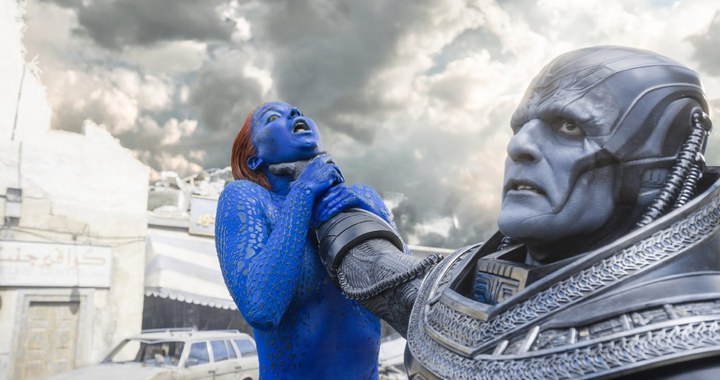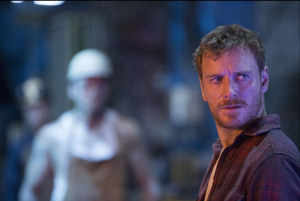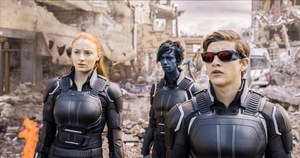
Jennifer Lawrence and Oscar Isaac in X-Men: Apocalypse.
Twentieth Century Fox Film Corporation
X-Men: Apocalypse gives you a glimpse of Oscar Isaac, bare-chested, bald, and beautiful, in its opening flashback in Egypt in 3600 BCE.
It's a tease. A minute later, the blue powers of its title villain, né En Sabah Nur, seep inside of him and take him over as part of a consciousness-transferring, body-snatching procedure, and Isaac spends the rest of the movie encased in blue makeup and bewildering motivations as he seeks to remake the world and reappoint himself as its god.
Isaac isn't the only big name to have been woven into the franchise - Apocalypse, like the two previous movies, flounders at giving Jennifer Lawrence (way more famous now than when she appeared in 2011's X-Men: First Class) more non-blue screen time and a place of prominence. But Isaac's appearance in the film seems a particular waste after he proved himself so resoundingly last year as both an actor and a heartthrob. It's not just that you can barely see Isaac; it's that Apocalypse is such an incredible letdown as a foe, with his fixation on being worshipped, the amount of time he spends recruiting an entourage, and, frankly, the micromanaging attention he gives his henchmen's various new looks.

Michael Fassbender
Alan Markfield / 20th Century Fox
For an ancient antagonist reaching back to the dawn of time - the first mutant! The baddest bad to have ever badded! - Apocalypse is neither frightening nor memorable, aside from the way he personally applies the facial decal on one of his four followers. After emerging in 1983 following millennia of being buried underground, Apocalypse catches up on the current status of the planet by absorbing it through a television. "Learrrning," he groans, like a very drunk Leeloo from The Fifth Element. Getting to the "war part," he likes it, and he decides unworthy humans have been in charge for too long and it's time for him to put mutants back on top. He turns people into sand. He's camp, but the rest of the movie isn't - the rest of the movie tries to parcel out earnest angst to its many, many characters, leaning on recognition from past X-Men installments to give them a wholeness that the film doesn't have time to fill out itself.
The biggest recipient is Magneto (Michael Fassbender), who's gone to ground since Days of Future Past, hiding in Eastern Europe, married with a daughter and a factory job. That life is taken from him, abruptly and awfully, in what is essentially a police shooting after he outs himself as a mutant by saving someone at work. It's one of the few instances of regular ol' humanity in the movie, and it's only in the context of a character careening back to wanting to destroy it. Fassbender is the tormented heart of the X-Men prequels, imbuing his character with soulful tragedy (and still giving the best "I'm using my superpowers" grimace in the business), but he struggles to bring freshness to Magneto's latest cycle of destroy/remorse in this sequel, even when he levels Auschwitz with new, Apocalypse-issued strength. It's a scene that should be audacious, but instead is a shrug, the wreckage spiraling prettily into the air - his powers are bigger, but not more meaningful.

Sophie Turner, Kodi Smit-McPhee, and Tye Sheridan.
20th Century Fox
Apocalypse director Bryan Singer's always had a way with the beats between the action, the ones that made mutantism such an all-purpose stand-in for the targets of intolerance - Iceman's "coming out" to his parents in X2; Rogue's fear that her own body and sexuality were deadly in the X-Men world, when her first kiss sent someone into a coma; Mystique spitting about how "people like you are the reason I was afraid to go to school as a child"; Magneto's powers rumbling to life in that Nazi concentration camp. But in Apocalypse, the "you're with us or against us" of it all is as abstract as that scene of Magneto vowing a new genocide while obliterating the site of a past one. The baby mutants - like Jean Grey (Sophie Turner), Cyclops (Tye Sheridan), and Nightcrawler (Kodi Smit-McPhee) - have little interaction with the outside world after their introductions. In the big finish, we're given flashes of some worried faces in a war room to provide a reminder of the mostly offscreen stakes of the battle.
Apocalypse focuses on mutant-on-mutant action, with Beast (Nicholas Hoult), Quicksilver (Evan Peters, once again getting the best scene in the movie), Mystique (Lawrence, looking uncharacteristically at sea), and Xavier (James McAvoy) on one side and Apocalypse and his horsemen Angel (Ben Hardy), Storm (Alexandra Shipp), Psylocke (Olivia Munn, weakest of the bunch), and Magneto on the other. But Apocalypse is so silly, and his actions are so lacking the pained resonance of past movies' clashes - that fundamental schism over what's best for mutantkind - that it hardly matters. They fight, and some change their mind, and for some, it wasn't clear why they were fighting in the first place. Like Oscar Isaac in that first scene, Apocalypse loses its humanity early on, and never figures out what to replace it with.
No comments:
Post a Comment